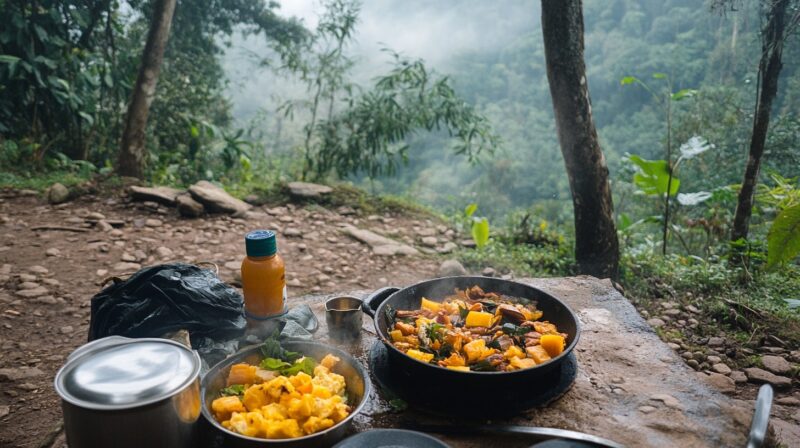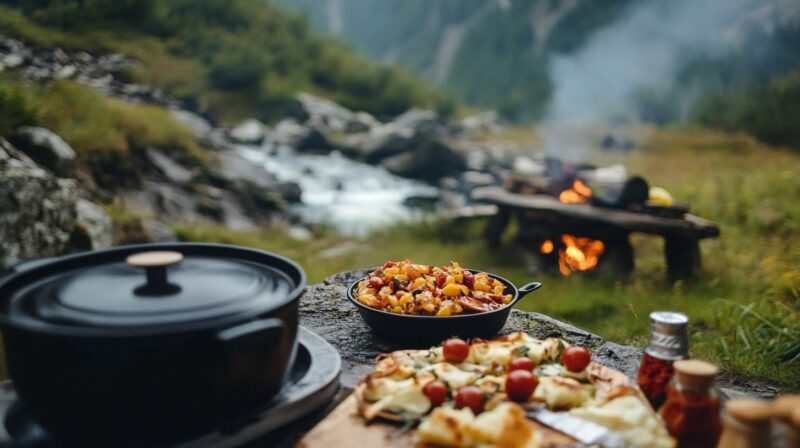When planning a hiking trip, proper food planning is crucial for a successful and enjoyable experience.
Beginners often make the mistake of poor meal preparation, which can significantly affect their overall hiking performance and enjoyment.
Understanding common pitfalls and how to avoid them is essential.
1. Packing Too Much Food
One common mistake among beginner hikers is overestimating the amount of food needed, resulting in unnecessarily heavy backpacks.
It can lead to quicker fatigue and a less enjoyable hiking experience.The solution lies in careful meal planning.
Beginners should calculate their daily caloric needs based on the hike’s intensity and duration.
Opt for lightweight, high-energy foods such as nuts, energy bars, and dried fruits which provide significant energy without the added weight.
Pre-planning meals and snacks for each day can prevent overpacking and help maintain a manageable pack weight.

2. Not Packing Enough Food
Conversely, underestimating food needs can be just as detrimental. Running out of energy due to insufficient food leads to a compromised hiking experience and can be dangerous.
To avoid this, hikers should calculate their expected daily calorie burn, which varies depending on the trail’s difficulty and the hiker’s weight and fitness level.
Packing nutrient-dense snacks like trail mix, jerky, and granola, along with a small buffer of extra food, ensures that energy levels remain stable throughout the hike.
It’s better to carry a little extra food than not enough, especially on unfamiliar or challenging trails.
3. Lack of Variety
Eating a repetitive menu while hiking can quickly lead to what’s known as “food fatigue,” a situation where meals become so uninteresting that hikers might skip eating regularly, leading to decreased energy and a diminished hiking experience.
To prevent this, it’s crucial to plan meals that include a variety of flavors, textures, and nutritional content.
Introducing a diverse range of food options keeps eating on the trail exciting and appetizing. Savory spreads like hummus or peanut butter can be paired with whole-grain crackers or tortillas for a satisfying snack.
Sweet dried fruits provide a quick energy boost and satisfy sweet cravings naturally.Crunchy nuts and seeds are not only filling but also rich in essential fats and protein, supporting sustained energy release. Chewy granola bars or energy bars can offer a mix of oats, nuts, and fruits, making them a delicious and efficient snack.
Incorporating this diversity also ensures that a range of nutrients vital for maintaining high energy levels and overall health is consumed.
- Proteins for muscle repair
- Carbohydrates for energy
- Fats for long-lasting fuel
- Vitamins and minerals for various metabolic functions

4. Too Many Sweet Foods
Overpacking sugary snacks can cause rapid spikes and drops in blood sugar levels, leading to energy crashes that can affect a hiker’s stamina and mood.
Instead, it is crucial to balance sweet and savory foods. Including items like nuts, seeds, and cheese can provide sustained energy.
Savory snacks also help maintain electrolyte balance, important for preventing muscle cramps and dehydration.Alternating between sweet and savory foods can keep energy levels more stable and make meals more satisfying.
5. Packing Bulky Foods
Choosing foods that are bulky or have excessive packaging can take up valuable space and contribute to unnecessary weight.
Hikers should focus on compact, high-calorie options like concentrated energy gels, nut butters, and vacuum-sealed pouches containing tuna or chicken.
Transferring foods to resealable bags not only reduces space but also minimizes waste, making it easier to pack out trash.
Such strategies optimize pack space and weight, making the hiking experience more comfortable and manageable.
6. Packing Heavy Foods

Including heavy food items, particularly those in cans or glass jars, is a common oversight. These items increase pack weight and reduce mobility.
The ideal alternatives are dehydrated or freeze-dried meals, which are light and only require the addition of hot water.
These meals are designed to be compact, lightweight, and nutritious, providing the necessary energy without the weight of traditional canned goods.
Avoiding heavy packaging materials and opting for lightweight containers can further reduce the load.
7. Not Including Enough Nutrient-Rich Foods
Focusing solely on calories rather than nutritional balance can lead to deficiencies that affect health and hiking performance.
To ensure a balanced diet on the trail, hikers should include foods rich in vitamins, minerals, and proteins.Options like dried fruits and vegetables, nuts, seeds, and whole grains provide dense nutrition without significant weight.
These foods help in maintaining muscle function, energy levels, and overall health, making them ideal for strenuous activities like hiking.
8. Planning Elaborate Meals

Bringing ingredients for complex meals that require extensive preparation can be impractical on the trail. Simple, easy-to-prepare options are best.
Pre-made dehydrated meals are an excellent choice as they are designed to be convenient and quick to prepare, requiring only hot water.
For those who prefer cooking, simple ingredients that can be easily combined into a meal, like instant rice, dehydrated vegetables, and pre-cooked meats, are advisable.
These simplify cooking and minimize the time spent preparing food, allowing more time for enjoying the hike.
9. Forgetting Essential Add-Ons
Small items like spices and condiments may seem insignificant but can greatly enhance the enjoyment of meals. Forgetting these can result in bland, unappetizing food.
Packing lightweight, individual packets of condiments, or small containers of spices can make a significant difference.
Items such as salt, pepper, hot sauce, and a small bottle of olive oil can transform a meal without adding considerable weight or bulk to a pack.
10. Ignoring Personal Dietary Needs and Preferences

Not accounting for personal dietary needs and preferences can lead to discomfort and dissatisfaction.
Hikers should test their trail meals at home to ensure they will be both satisfying and digestible on the trail.
Whether it’s food allergies, dietary restrictions, or simply personal taste, accommodating these needs ahead of time prevents complications.
Packing familiar, tried-and-tested food items ensures that meals will not only provide the necessary nutrition but also enhance the overall hiking experience.
The Bottom Line
Proper food planning is pivotal for a successful hiking trip.
By learning from common mistakes and implementing the suggested solutions, beginners can enhance their hiking experience significantly.
Well-planned meals not only provide necessary energy and nutrition but also add to the enjoyment of the adventure.
With thoughtful preparation, hikers can ensure that their nutritional needs are met, allowing them to fully engage with and enjoy their surroundings.

